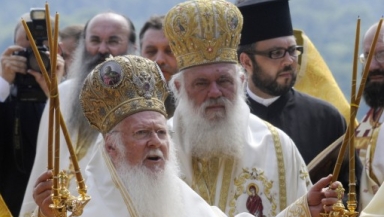The head of the Pope's doctrine division has called for divisions over the treatment of divorced and remarried Catholics to end.
Cardinal Gerhard Müller, Prefect of the Congregation for the Doctrine of the Faith, has indicated that the Vatican will not be responding to a letter from the four cardinals challenging the Pope over his apparent attempts to soften current discipline.
The dispute concerns Catholics who remarry without obtaining an annulment of their first marriage.
Traditionalists believe such Catholics are living in a state of sin because of the teaching that marriage is for life, and must therefore be excluded from receiving Holy Communion.
The four cardinals are challenging the Pope on his teaching after he wrote to bishops in his home country of Argentina confirming their interpretation of Amoris Laetitia, his exhortation following the two synods on the family.
Pope Francis told the Argentine bishops that divorced and remarried Catholics could in "some cases" receive Holy Communion without living as "brother and sister" and without getting an annulment.
Müller has addressed the controversy because his congregation is the Church's arbiter of doctrinal disputes.
He said in an interview with the German website Kathpress in Rome that there will be no formal response to the letter from the four cardinals and warned against the danger of "polarisation".
He said the indissolubility of marriage remained "the unshakable basis of any pastoral accompaniment" but that the Pope wanted to help all families in difficulty "to find a way of concurring with the ever-merciful will of God".
Müller also commented on the Church's "trench warfare" over the issue. He criticised the fighting "between reformers and brawlers" and stated that what is important is "the victory of truth and not the triumph of power".
Meanwhile, the Orthodox Patriarch Bartholomew of Constantinople has commented on the exhortation.

He said it "first and foremost recalls the mercy and compassion of God and not just moral norms and canonical rules".
"In the past few months, numerous comments and evaluations of this important document have been made," the patriarch wrote in L'Osservatore Romano, the Vatican newspaper.
"People have asked how specific doctrine has been developed or defended or if pastoral questions have been modified or resolved and if particular norms have been strengthened or mitigated. Whether it regards the challenges of marriage and divorce or sexuality or raising children," the matters treated in the document "are all delicate and precious fragments of that sacred mystery we call life."
For too long, he said, people were "suffocated and blocked" from reaching out to God for forgiveness and strength by the notion of a "heavenly Father who in some way dictated human conduct".
"Religious leaders are called to remind themselves and then others that God is life and love and light," he wrote. "In fact, these are the words repeatedly underlined by Pope Francis in his document, which discerns the experience and challenges of contemporary society with a view toward describing a spirituality of marriage and the family for today's world."













